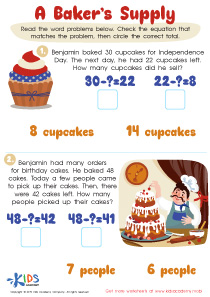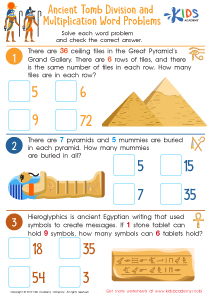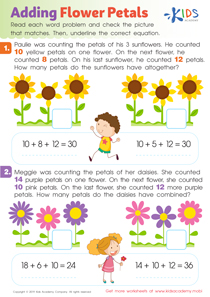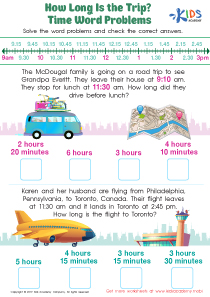Length and Mass Word Problems Worksheets for 3-Year-Olds
1 filtered results
-
From - To
Introduce your little ones to the concepts of length and mass with our tailor-made worksheets, designed specifically for three-year-olds. These engaging and colorful School Homework Sheets provide a fun and interactive way to explore basic measurements through carefully crafted word problems. Perfect for early learners, each worksheet is filled with simple, age-appropriate activities that not only teach but also enhance fine motor skills and cognitive development. Help your child build a strong foundation in essential math skills early on with our Length and Mass Word Problems worksheets. Ideal for both home and classroom use.
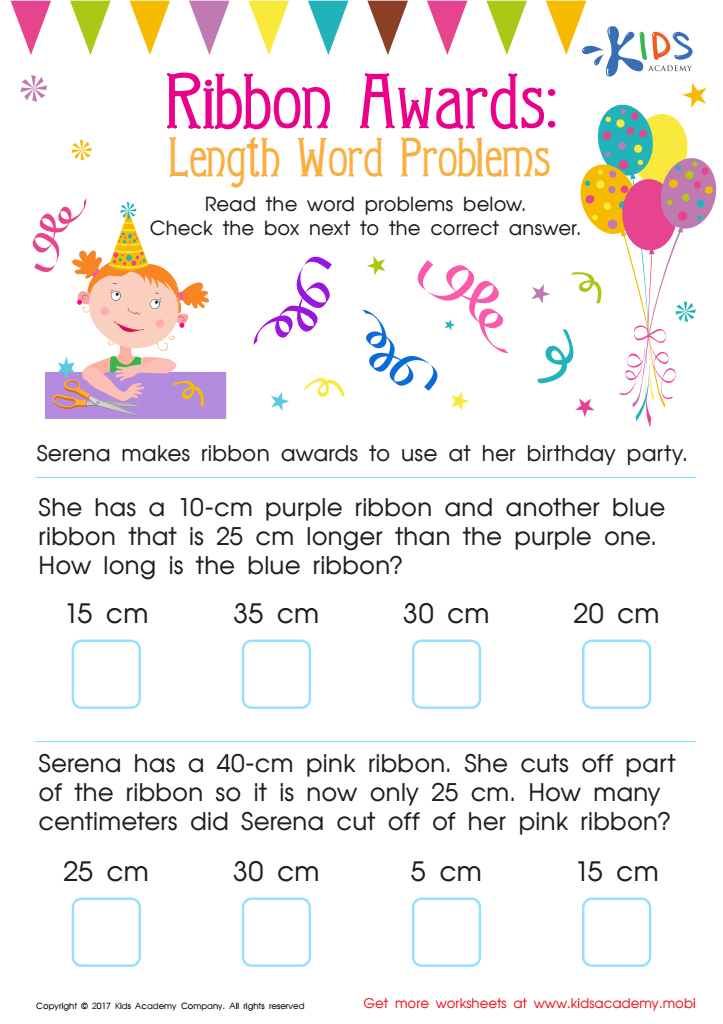

Length Word Problems Worksheet
Introducing worksheets on Length and Mass Word Problems to three-year-old children can be a valuable component of early childhood education, particularly when incorporated into homeschooling curriculums. These 'Homeschool Worksheets' are specifically designed to engage young learners at a critical stage of their development, helping them to explore basic concepts of measurement in a fun and interactive way. Here’s why these worksheets are particularly useful:
1. Foundational Skill Development
At the age of three, children are developing their cognitive and motor skills rapidly. Homeschool worksheets focused on length and mass word problems allow children to begin understanding basic mathematical concepts through physical interaction and visual representation. This early exposure helps in laying down the foundations of numeracy, promoting a deeper understanding of the world around them.
2. Enhanced Problem-Solving Abilities
Worksheets that challenge children with problems to solve can enhance critical thinking skills. Even at a young age, children can engage in problem-solving that involves real-life scenarios such as comparing lengths or weights. This not only makes the learning process enjoyable but also more meaningful, as they can relate the problems to things they encounter daily.
3. Language Development
Homeschool worksheets often include instructions and questions that necessitate reading or verbal interaction. This exposes young children to new vocabulary and language structures, revolving around the concepts of length and mass. Discussing these worksheets with an adult also boosts their language skills, as they learn to articulate their thoughts and ask questions.
4. Boosting Confidence and Independence
Engaging with worksheets gives children a sense of accomplishment once they complete the tasks. This boosts their confidence and encourages a positive attitude towards learning. Furthermore, as they navigate through the worksheets, they develop a sense of independence in handling tasks, which is crucial for their overall personal development.
5. Interactive Learning
Many homeschool worksheets are designed to be interactive, incorporating colorful images, stickers, or simple items from around the home to measure and compare. This element of play in learning not only keeps the child engaged but also helps in retaining their interest and focus. It makes the concept of measuring length and mass tangible and comprehensible even for young minds.
6. Customizable Learning Experience
Homeschooling allows for a customizable learning experience, and these worksheets can be tailored to the learning pace and interest of each child. Parents can include more practical experiments based on the child’s curiosity and responsiveness, making adjustments to the worksheets as needed. For instance, if a child shows more interest in learning about lengths, additional materials or modified worksheets focusing on this area can be provided to deepen understanding and maintain engagement.
7. Preparation for Future Academic Activities
Starting with simple worksheets at an early age prepares children for the structure and discipline of formal schooling. Regularly working on Homeschool Worksheets familiarizes them with the concept of sitting down and completing a task, following directions, and working within certain boundaries. This early introduction to a learning routine can ease the transition to more structured educational environments later.
8. Social Skills and Cooperation
Although primarily designed for individual learning, homeschool worksheets can also be a cooperative activity. Parents or siblings can participate in the learning process, guiding and supporting the child. This cooperative learning helps build social skills as the children learn to listen, follow instructions, and even take turns if working with a sibling or a peer on collaborative tasks.
9. Monitoring Development and Progress
For parents, these worksheets provide a practical insight into their child’s developmental progress. By observing how their child interacts with the worksheets, parents can assess areas of strength and those needing further development. This ongoing monitoring ensures that learning remains aligned with the child's growth needs, allowing for timely intervention if necessary.
10. Fun and Enjoyment
Above all, learning at this age should be fun, and well-designed Homeschool Worksheets ensure that learning about length and mass is enjoyable. They often include elements of games, storytelling, and discovery, which are crucial for maintaining the child’s interest. Fun activities boost a child’s eagerness to learn and explore, setting a positive tone for future educational pursuits.
In conclusion, introducing Length and Mass Word Problems through Homeschool Worksheets to three-year-old children offers a multitude of benefits. These worksheets not only facilitate early mathematical and language skill development but also enhance problem-solving abilities, independence, and confidence. Customizable and fun, they play a critical role in shaping young learners' educational journeys right from the start.
 Assign to the classroom
Assign to the classroom
